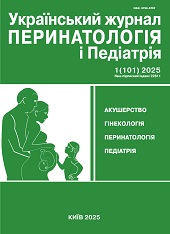The safety and effectiveness of non-hormonal treatment in menopausal disorders
DOI:
https://doi.org/10.15574/PP.2025.5(101).1014Keywords:
menopause, climacteric disorders, hormone therapy, contraindications, non-hormonal therapy, herbal remediesAbstract
The use of non-hormonal therapy for the manifestations of CR will significantly improve the quality of life of women in the menopausal period due to its effectiveness and absence of side effects. It will also solve the issue of correcting menopausal disorders in women in whom menopausal hormone therapy is contraindicated.
Aim - to assess the safety and effectiveness of the herbal preparation Menoel® PLUS (EstroG-100®) in the treatment of menopausal disorders.
Materials and methods. The study involved 40 women of menopausal age with climacteric disorders. After confirmation of climacteric disorders in patients, they were distributed as follows: the Group I - 20 participants received MHT; the Group II included 20 women who received: the Subgroup IIA - 10 women: MHT and Menoel® PLUS; the Subgroup IIB - 10 women who had contraindications to MHT received Menoel® PLUS as monotherapy.
Results. Over 6 months of therapy, the indicators of psychological and somato-vegetative manifestations of the MRS scale significantly decreased in women using menopausal hormone therapy and Menoel® PLUS. The assessment of the mental tension index on the PSM-25 scale demonstrated that during 6 months of treatment, a clinically significant effect was obtained in the both groups, but in the Subgroup IIA it was more significant - already in 3 months the stress level decreased from 169.4±8.6 to 121.6±8.6 points, and in 6 months to 102±8.3 (p<0.05).
Conclusions. Non-hormonal drugs (Menoel® plus) can be used in combination with MHT for the treatment of climacteric disorders and are the only option for women with contraindications to estrogen or progestogen therapy.
The study was carried out in accordance with the principles of the Declaration of Helsinki. The study protocol was approved by the Committee on bioethics and deontology of these institutions. The informed consent of the children's parents was obtained for the research.
No conflict of interests was declared by the author.
References
Chang A, Kwak BY, Yi K, Kim JS. (2012). Effects of a herbal extract (EstroG-100) on pre-, peri-, and postmenopausal women: a randomized double-blind placebo-controlled trial. Phytother Res. 26: 510-516. https://doi.org/10.1002/ptr.3597; PMid:21887807
Kell G, Rao A, Beccaria G, Clayton P, Inarejos-García AM, Prodanov M. (2017, Aug). Affron® a novel saffron extract (Crocus sativus L.) improves mood in healthy adults over 4 weeks in a double-blind, parallel, randomized, placebo-controlled clinical trial. Complement Ther Med. 33: 58-64. Epub 2017 Jun 13. https://doi.org/10.1016/j.ctim.2017.06.001; PMid:28735826
Kim SJ, Jin SW, Lee GH, Kim YA, Jeong HG. (2017. Jan). Evaluation of Estrogenic Activity of Extract from the Herbal Mixture Cynanchum wilfordii Hemsley, Phlomis umbrosa Turczaninow, and Angelica gigas Nakai. Toxicol Res. 33(1): 71-77. Epub 2017 Jan 15. https://doi.org/10.5487/TR.2017.33.1.071; PMid:28133516 PMCid:PMC5266372
Kirubamani H, Ahire P, Stalin C. (2023, Oct-Dec). Evaluation of Efficacy and Safety of EstroG-100® in Alleviating Menopausal Symptoms in Postmenopausal Women in India: A Prospective, Single-center, Single-arm, Interventional Study. J Midlife Health. 14(4): 285-290. Epub 2024 Feb 23. https://doi.org/10.4103/jmh.jmh_220_23; PMid:38504729 PMCid:PMC10946679
Lopresti AL, Smith S. (2021). The Effects of a Saffron Extract on Menopausal Symptoms in Women during Perimenopause: A Randomised, Double-Blind, Placebo-Controlled Study. J Menopausal Med. 27(2): 66-78. https://doi.org/10.6118/jmm.21002; PMid:34463070 PMCid:PMC8408316
Lopresti AL, Smith S, Hood S, Drummond P. (2019). Efficacy of a standardised saffron extract as an add-on to antidepressant medication for the treatment of persistent depressive symptoms in adults: A randomised, double-blind, placebo-controlled study. J Psychopharmacol. 33(11): 1415-1427. https://doi.org/10.1177/0269881119867703; PMid:31475623
Lopresti AL, Smith S, Metse A, Drummond P. (2020). Effects of saffron on sleep quality in healthy adults with self-reported poor sleep: a randomized, double-blind, placebo-controlled trial. J Clin Sleep Med. 15; 16(6): 937-947. https://doi.org/10.5664/jcsm.8376; PMid:32056539 PMCid:PMC7849671
MOZ Ukrainy. (2022). Unifikovanyi klinichnyi protokol pervynnoi, vtorynnoi (spetsializovanoi), tretynnoi (vysokospetsializovanoi) medychnoi dopomohy «Menopauzalni porushennia ta inshi rozlady v perymenopauzalnomu periodi». Nakaz MOZ Ukrainy vyd 17 chervnia 2022 roku No. 1039. URL: https://www.dec.gov.ua/wp-content/uploads/2022/06/37474-dn_1039_17_06_2022_dod.pdf.
NUOZU. (2021). Scientific and practical conference "Women's health 40+ from treatment tactics to aesthetic results and active longevity. URL: https://www.nuozu.edu.ua/n/p/8542-zdorovia-zhinky-40-vid-likuvalnoi-taktyky-do-estetychnoho-rezultatu-ta-aktyvnoho-dovholittia.
Orio L, Alen F, Ballesta A, Martin R, Gomez de Heras. (2020). Antianhedonic and Antidepressant Effects of a Standardized Saffron (Crocus Sativus L.) Extract. Molecules. 25(14): 3207. https://doi.org/10.3390/molecules25143207; PMid:32679643 PMCid:PMC7397008
Tatarchuk T, Rekheda S, Kosei N, Zakharenko N, Plaksiieva K. (2024). Nehormonalni metody korektsii klimakterychnykh rozladiv u zhinok. Reproduktyvna endokrynolohiia. (71): 45-52. https://doi.org/10.18370/2309-4117.2024.71.45-52
Villiers T, Tatarchuk T, Avramenko N. Bulavenko O, Gabal V, Burlaka O et al. (2016). National consensus on the management of patients in menopause. Medical aspects of women's health. 2-1(99). URL: https://mazg.com.ua/ua-issue-article-912.
Downloads
Published
Issue
Section
License
Copyright (c) 2025 Ukrainian Journal of Perinatology and Pediatrics

This work is licensed under a Creative Commons Attribution-NonCommercial 4.0 International License.
The policy of the Journal “Ukrainian Journal of Perinatology and Pediatrics” is compatible with the vast majority of funders' of open access and self-archiving policies. The journal provides immediate open access route being convinced that everyone – not only scientists - can benefit from research results, and publishes articles exclusively under open access distribution, with a Creative Commons Attribution-Noncommercial 4.0 international license(СС BY-NC).
Authors transfer the copyright to the Journal “MODERN PEDIATRICS. UKRAINE” when the manuscript is accepted for publication. Authors declare that this manuscript has not been published nor is under simultaneous consideration for publication elsewhere. After publication, the articles become freely available on-line to the public.
Readers have the right to use, distribute, and reproduce articles in any medium, provided the articles and the journal are properly cited.
The use of published materials for commercial purposes is strongly prohibited.

